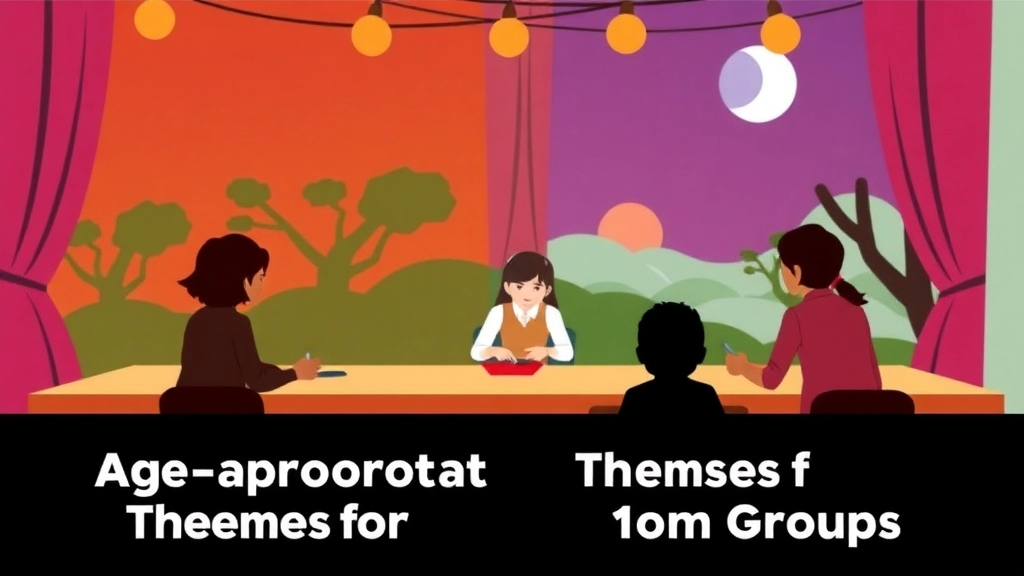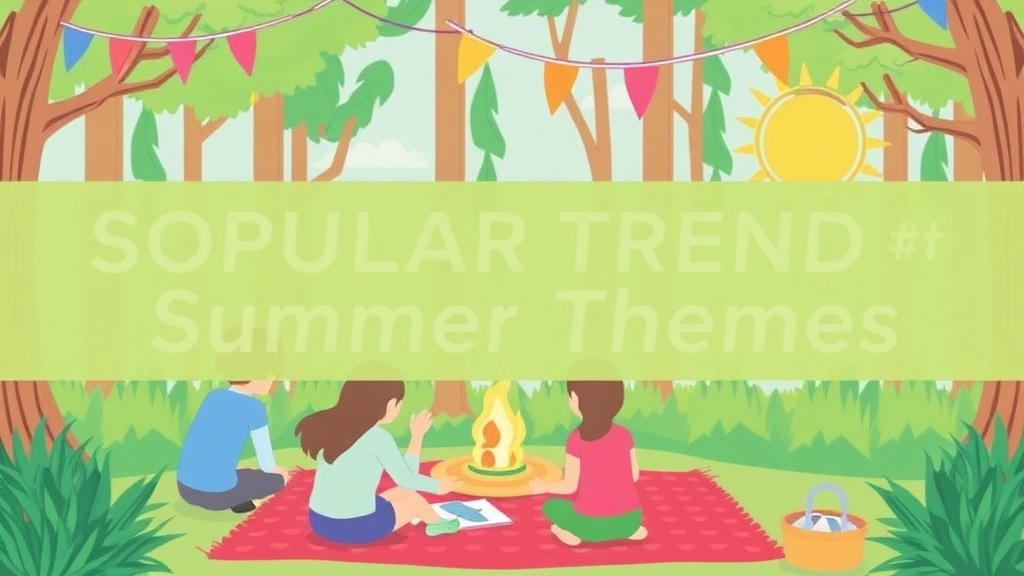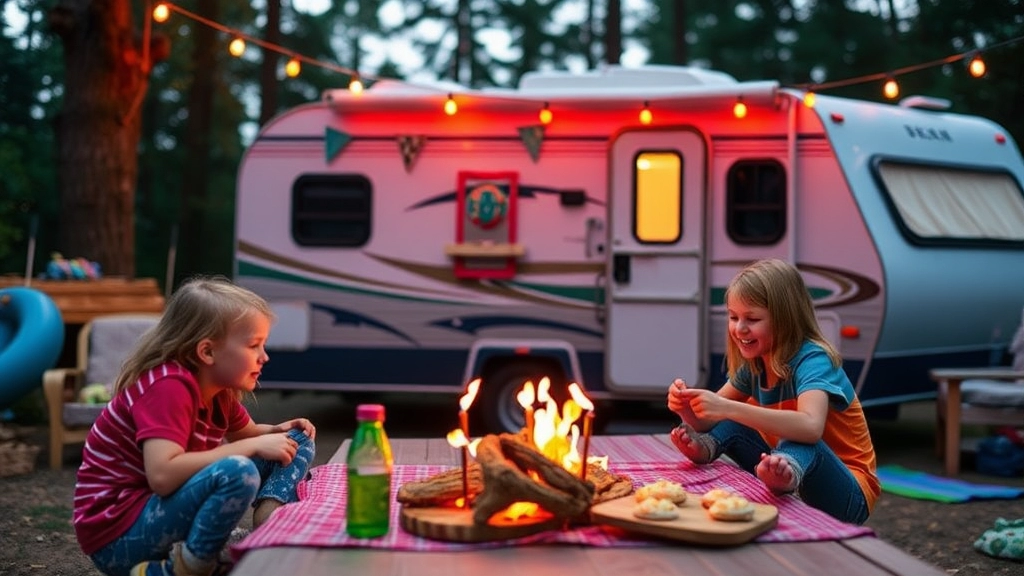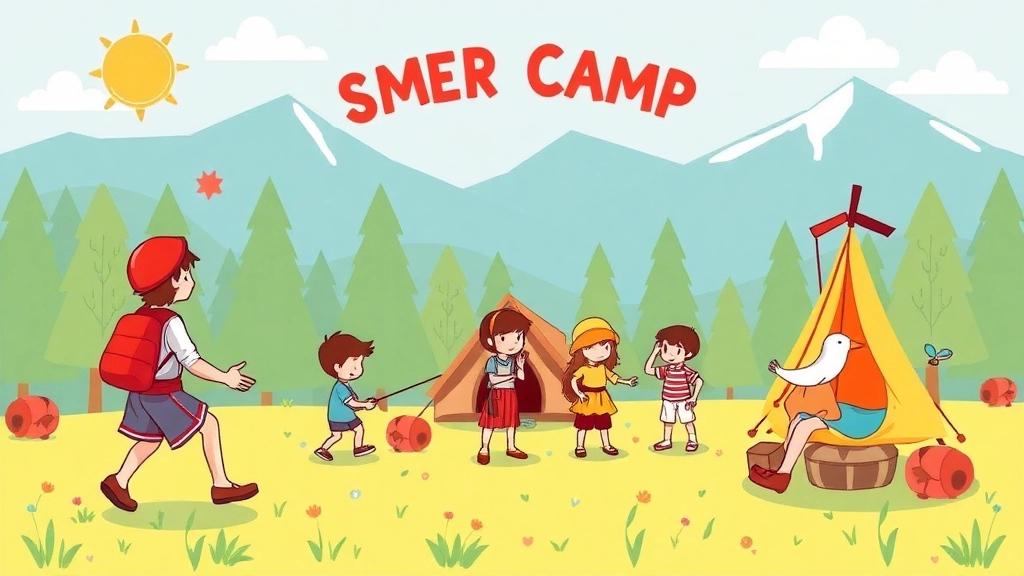Planning a Summer Camp
Planning a summer camp that stands out can be a daunting task, but choosing the right theme can make all the difference. This article delves into the world of summer camp themes, offering creative ideas, age-appropriate suggestions, and strategies for incorporating educational elements. We’ll explore popular trends, provide tips on planning activities, and discuss how to engage both parents and campers effectively.
Creative Ideas and Strategies
From cost-effective implementation strategies to evaluating the success of your camp theme, we’ve got you covered. Whether you’re a seasoned camp organizer or a newbie, this guide will help you create an unforgettable experience.
Transform Your Camp
Dive in to discover how the right summer camp themes can transform your camp into the highlight of every child’s summer.
Creative Summer Camp Theme Ideas
Alright, let’s dive into some creative summer camp theme ideas that will make your camp the talk of the town. Whether you’re dealing with kids who can’t sit still or teens who think they’ve seen it all, there’s something here for everyone.
Why Themes Matter
First off, why even bother with a theme? Well, themes give structure to your camp, making it easier to plan activities and keep everyone engaged. Plus, they create a sense of excitement and anticipation. Remember the last time you were pumped about something? That’s the vibe we’re aiming for here.
Adventure and Exploration
Kids love a good adventure. Here’s how you can tap into that:
- Treasure Hunt Week: Think pirate maps, hidden treasures, and secret codes. This theme is perfect for younger kids who love a good mystery.
- Survival Skills Camp: Teach basic survival skills like building a fire, finding food, and setting up a tent. This works great for older kids and teens.
- Space Exploration: Turn your camp into a space station. Activities can include building rockets, stargazing, and learning about planets.
Arts and Creativity
If you’ve got a bunch of budding artists, these themes will be a hit:
- Art Attack: Each day focuses on a different art formâpainting, sculpting, digital art, you name it.
- Drama Week: Put on a play by the end of the week. Kids can be involved in everything from acting to set design.
- Music Mania: Bring in local musicians for workshops, and let the kids create their own band.
Science and Discovery
For the curious minds out there, science-themed camps are gold:
- Mad Scientist Lab: Simple experiments that wow. Think volcanoes, slime, and basic chemistry.
- Nature Detectives: Explore the local flora and fauna. Perfect for camps located near forests or parks.
- Tech Camp: Coding, robotics, and all things tech. Ideal for older kids who are tech-savvy.
Sports and Fitness
Got a bunch of energy-filled kids? Channel that into something productive:
- Olympic Games: Create your own mini-Olympics with different sports each day.
- Extreme Sports: Skateboarding, BMX biking, or even rock climbing if you have the facilities.
- Fitness Boot Camp: Fun workouts, obstacle courses, and nutrition lessons.
Cultural and Historical Themes
Expand their horizons with these themes:
- Around the World: Each day focuses on a different country. Food, music, and customs from around the globe.
- Time Travel: Each day is a different eraâMedieval Times, Ancient Egypt, the Roaring ’20s.
- Mythology Week: Greek gods, Norse legends, and mythical creatures. Great for storytelling and creative activities.
Age-Appropriate Themes for Different Groups

Ever wonder how to nail the perfect summer camp theme for different age groups?
Yeah, me too.
It’s a challenge, but we’re going to break it down.
Why Age Matters
Kids are like sponges, but they soak up different things at different ages.
What excites a 5-year-old might bore a 12-year-old to tears.
So, let’s get this right.
Themes for Young Kids (Ages 5-7)
These little ones are all about imagination and play.
Think fairy tales, superheroes, and animal adventures.
- Fairy Tales: Stories like Cinderella or Jack and the Beanstalk.
- Superheroes: Create your own superhero identity.
- Animal Adventures: Safari themes or trips to a petting zoo.
Themes for Tweens (Ages 8-12)
Tweens want a bit more challenge and excitement.
They’re into science, mystery, and sports.
- Science: DIY experiments, think slime and volcanoes.
- Mystery: Treasure hunts and escape rooms.
- Sports: Mini-Olympics or themed sports days.
Themes for Teens (Ages 13-17)
Teens crave independence and real-world experiences.
They dig leadership, tech, and outdoor adventures.
- Leadership: Team-building exercises and public speaking.
- Tech: Coding camps or robotics.
- Outdoor Adventures: Hiking, camping, and survival skills.
Mixing It Up
You can mix themes to keep things fresh.
A week of science followed by sports keeps everyone on their toes.
Real-World Example
Last summer, we had a camp where the younger kids did a “Dinosaur Dig” theme.
The tweens had a “CSI Mystery” week.
And the teens went on a “Wilderness Survival” adventure.
Key Takeaways
- Know your audience: Tailor the theme to the age group.
- Mix it up: Don’t stick to one theme for too long.
- Get feedback: Ask the kids what they want.
Incorporating Educational Elements into Camp Themes
Ever wonder how to make summer camp both fun and educational? It’s a common worry for many of us planning these camps. We want kids to have a blast, but we also want them to learn something valuable. How do we balance the two without making it feel like school all over again? Let’s dive into this and break it down.
Why Mix Education with Fun?
First off, why should we even bother mixing education into camp themes? Simple. Kids are like spongesâthey absorb everything around them. If we can sneak in some learning while they’re having fun, it’s a win-win. They get the joy of summer camp, and you get the satisfaction of knowing you’ve enriched their minds.
Easy Ways to Add Educational Elements
You might be thinking, “Great, but how do I do this?” Here are some straightforward methods to incorporate educational elements into your camp themes:
- Interactive Workshops: Think science experiments, art classes, or even cooking lessons. Kids love hands-on activities, and they won’t even realise they’re learning. Check out these art summer camps for inspiration.
- Storytelling Sessions: Use stories to teach history, culture, or important life lessons. Make it engaging by letting kids act out parts or create their own endings.
- Nature Walks: Turn a simple hike into a biology lesson. Point out different plants, insects, and animals. Teach them about ecosystems and conservation.
- Themed Games: Design games that align with your theme but have an educational twist. For example, a treasure hunt that requires solving math problems to find clues.
Real-Life Examples
Let’s talk about a couple of real-life examples to make this more concrete.
- Space Camp: Imagine a camp themed around outer space. You could have activities like building model rockets, stargazing sessions with telescopes, and even coding simple computer programs to simulate space missions. Kids learn about astronomy, physics, and technologyâall while thinking they’re just having a blast. Consider enrolling in a coding summer camp to enhance these skills.
- Eco Warriors: How about a theme focused on environmental conservation? Activities could include recycling projects, building birdhouses, and planting trees. Kids learn about sustainability, biology, and the importance of taking care of our planet.
Making It Stick
The key to making educational elements stick is to integrate them seamlessly into the fun. Here’s how you can do it:
Popular Trends in Summer Camp Themes

Alright, let’s dive into it.
What’s hot in summer camp themes?
You might be wondering, “What themes are kids actually excited about these days?”
You don’t want to pick something outdated or boring.
We get it.
Here’s the lowdown on what’s trending.
STEM Adventures
Kids love tech, and parents love that it’s educational.
- Robotics workshops
- Coding challenges
- Science experiments
These activities are a hit.
Eco Warriors
With climate change on everyone’s mind, eco-friendly themes are booming.
- Nature hikes
- Recycling projects
- Gardening sessions
They make learning about the environment fun.
Fantasy Worlds
Think Harry Potter, Narnia, and Middle Earth.
- Magic shows
- Costume days
- Treasure hunts
Kids get to live out their favourite stories.
Sports Extravaganza
Sports never go out of style.
- Multi-sport tournaments
- Fitness challenges
- Team-building games
Keeps them active and competitive.
Cultural Explorations
Expose kids to different cultures.
- Cooking classes
- Dance workshops
- Language lessons
It’s educational and broadens their horizons.
Art Attack
For the creative souls.
- Painting classes
- Craft workshops
- Drama sessions
Let their creativity run wild.
Survival Skills
Think Bear Grylls but for kids.
- Camping skills
- First aid training
- Orienteering
Teaches them practical life skills.
Space Odyssey
Space is always fascinating.
- Astronomy lessons
- Rocket building
- Planetarium visits
Makes them dream big.
Mystery & Detective
Kids love a good mystery.
- Clue-solving games
- Escape rooms
- Spy missions
Keeps them engaged and thinking.
Digital Detox
A break from screens.
- Outdoor games
- Board games
- Storytelling sessions
Helps them reconnect with the real world.
So, why are these themes popular?
They mix fun with learning.
They keep kids engaged.
And they make parents happy.
How to Choose the Right Theme
- Know your audience.
- Consider your resources.
- Think about the educational value.
Remember, the right theme can make or break your camp.
Got any other ideas?
Share them in the comments below.
Choosing the right theme isn’t just about following trends.
It’s about making the summer unforgettable.
So, pick wisely.
And have fun with it.
Popular trends in summer camp themes can set the stage for an amazing experience.
Keep it fresh.
Keep it engaging.
And you’ll have a camp that everyone talks about.
How to Plan Activities Around Camp Themes
Alright, let’s talk about planning activities around camp themes. This is where the magic happens, folks. You’ve got a killer theme, but now what? How do you turn that theme into an unforgettable experience for the kids? Trust me, it’s simpler than you think.
Why is Planning Activities Around Camp Themes Crucial?
First off, why should you even bother? Well, here’s the deal:
- Engagement: Kids are more likely to get involved if the activities are tied to a cool theme.
- Memorability: A well-executed theme makes the camp unforgettable.
- Learning: Themes can sneak in educational elements without the kids even realising it.
Step-by-Step Guide to Planning Activities
- Brainstorming Session
- Gather your team and throw out every idea, no matter how wild.
- Use mind maps to connect different activities to your theme.
- Categorise Activities
- Physical: Sports, obstacle courses, scavenger hunts.
- Creative: Arts and crafts, storytelling, music.
- Educational: Science experiments, history walks, nature studies.
- Create a Schedule
- Mix and match activities to keep things fresh.
- Balance between high-energy and low-energy activities.
- Resource Check
- Make a list of all the materials you’ll need.
- Pro Tip: Reuse and recycle materials to keep costs down.
Example: Pirate-Themed Camp
Let’s say you’re going with a pirate theme. Here’s how you can break it down:
- Treasure Hunt: Create a map and clues leading to hidden treasures.
- Shipbuilding: Use cardboard and other materials to build mini pirate ships.
- Pirate Stories: Have a storytelling session around a campfire.
- Water Games: Incorporate water balloons and relay races to mimic sea battles.
Real Questions and Worries
Q: What if kids get bored?
A: Rotate activities frequently and keep them short and sweet. No one likes to be stuck doing the same thing for hours.
Q: How do I handle different age groups?
A: Tailor the complexity of activities to different age groups. Younger kids might enjoy simpler tasks, while older ones can handle more challenging activities.
Engaging Parents and Campers with Unique Themes

How do you get parents and campers excited about your summer camp themes?
That’s the million-dollar question.
Parents want their kids to have a blast and learn something new. Kids just want to have fun. So, how do you make both parties happy?
Make It Relatable
Themes that hit home are a win.
Think about what’s trending among kids and parents right now.
- Superheroes: Every kid has a favourite superhero. Plan activities around them.
- Space Exploration: With all the buzz about Mars, why not a space camp?
- Nature Adventures: Kids love the outdoors, and parents love the idea of unplugging.
Communicate Clearly
Parents need to know what’s in it for their kids.
Send out newsletters or emails detailing the theme and activities.
- Highlight Benefits: “Your child will learn teamwork and problem-solving through our superhero quests.”
- Use Visuals: Photos and videos make it real.
Involve the Parents
Parents love being part of the fun too.
- Family Days: Invite parents to join a day of camp activities.
- Showcases: End-of-camp performances or exhibitions let parents see what their kids have been up to.
Use Social Media
Everyone’s on social media.
- Teasers and Sneak Peeks: Post behind-the-scenes content.
- Live Updates: Share daily highlights to keep parents in the loop.
Feedback Loop
Ask for feedback and act on it.
- Surveys: After camp, send out a quick survey to parents and campers.
- Adjust and Improve: Use the feedback to tweak and enhance your themes for next year.
Real Stories
Share success stories.
- Testimonials: Parents and kids talking about their amazing experiences.
- Case Studies: Specific examples of how a theme positively impacted a camper.
Keep It Fresh
Change is good.
- New Themes Each Year: Rotate themes to keep things exciting.
- Mini-Themes: Introduce smaller themes within the main theme to keep it dynamic.
Cost-Effective Theme Implementation Strategies
Are you scratching your head over how to create an epic summer camp theme without breaking the bank? You’re not alone. Many camp organisers face the challenge of delivering a memorable experience while keeping costs in check. Let’s dive into some practical, cost-effective strategies to make your summer camp theme a roaring success.
Leverage What You Already Have
Start by taking stock of your current resources. You’d be surprised at how much you can do with what you already own. Here are some quick tips:
- Inventory Check: Go through your storage to see what materials and supplies can be repurposed. Old costumes, art supplies, and even sports equipment can be given a new lease of life.
- Multi-use Spaces: Transform existing spaces into thematic zones. A simple rearrangement of furniture or a few decorations can turn a dining hall into a medieval banquet or a science lab.
Collaborate and Share
Why go it alone when you can team up? Partnering with other camps or local organisations can save you a ton of money.
- Resource Sharing: Swap equipment, costumes, and even staff with neighbouring camps.
- Community Partnerships: Local businesses often love to get involved. They might provide materials or even sponsor parts of your camp in exchange for some publicity.
DIY Decorations and Costumes
Get crafty! Making your own decorations and costumes can be a fun activity for both staff and campers.
- Craft Sessions: Organise pre-camp craft sessions where volunteers and staff can create decorations. It’s a great way to build excitement and save money.
- Recycling: Use recycled materials to create props and costumes. Cardboard, fabric scraps, and paint can go a long way.
Digital Resources
The internet is your friend. There are countless free or low-cost resources available online.
- Printables: Download free printables for posters, banners, and activity sheets.
- Online Tutorials: Use YouTube and other tutorial sites to learn how to make props, costumes, and decorations.
Simplify Your Theme
Sometimes, less is more. A simple, well-executed theme can be just as impactful as a more complex one.
- Focus on Key Elements: Identify the core aspects of your theme and concentrate your resources there.
- Minimalist Approach: Use a minimalist approach to decorations and activities. It can be both stylish and cost-effective.
Involve the Campers
Why not let the campers contribute? This not only saves money but also makes them feel more involved.
- Camper Projects: Include theme-related projects in your activity schedule. For example, if your theme is “Space Adventure,” campers can create their own space helmets and badges.
- Talent Shows: Encourage campers to put on skits or performances related to the theme. It’s low-cost and high-fun.
Evaluate and Reuse
After the camp, take a moment to evaluate what worked and what didn’t. This will help you plan more effectively for the next year.
- Feedback: Gather feedback from campers and staff to see which elements were the most popular.
- Reuse Materials: Store decorations, costumes, and props that can be reused or repurposed for future themes.
Got any other cost-effective strategies you’d like to share? Drop them in the comments below!
Evaluating the Success of Your Camp Theme
Alright, let’s talk about evaluating the success of your camp theme.
Ever wonder if all that effort you put into your camp theme actually paid off?
You’re not alone.
It’s a common worry.
But don’t stress, I’ve got you covered.
Here’s how you can break it down and make sure your camp theme was a hit.
Step 1: Gather Feedback
First things first, get some feedback.
Ask the campers.
Ask the parents.
Ask the staff.
Surveys are your best friend here.
Keep them short and sweet.
- What did they love?
- What didn’t work?
- Any suggestions for next time?
Step 2: Observe Engagement Levels
Were the kids buzzing with excitement?
Did they participate in activities?
Engagement is a huge indicator.
If they’re bored, your theme needs a tweak.
Step 3: Track Attendance
Did you see an uptick in sign-ups?
Or did numbers drop?
Attendance figures can tell you a lot.
More kids usually mean you’re doing something right.
Step 4: Monitor Social Media
Check out your camp’s social media.
Are parents sharing pics?
Are there positive comments?
Social media buzz is a modern-day thumbs up.
Step 5: Review Learning Outcomes
If you’ve incorporated educational elements, did the kids actually learn?
Simple quizzes or activities can help you gauge this.
Step 6: Budget Analysis
Did you stick to your budget?
Or did you go overboard?
Financial success matters too.
Step 7: Staff Feedback
Your staff are on the front lines.
They’ll have insights you might miss.
Get their take.
Step 8: Compare to Past Themes
How does this theme stack up against previous ones?
Look at past data.
See what worked before and what didn’t.
Real-Life Example
Last summer, we tried a âSpace Adventureâ theme.
We saw a 20% increase in sign-ups.
Kids couldn’t stop talking about it.
Parents loved the educational twist.
We stuck to our budget.
And social media was lit up with photos and positive comments.
That’s a win in my book.
Final Thoughts
Evaluating the success of your camp theme isn’t rocket science.
It’s about feedback, engagement, attendance, and budget.
Keep it real.
Keep it fresh.
And you’ll nail it every time.
So, next time you’re wondering if your theme was a hit, just follow these steps.
You’ll know for sure.
If you’re looking for more tips on how to ensure your camp is a hit, check out our guide on summer camping top tips and gear essentials. And if you’re still planning your next camp, consider the STEM Gem Summer Camp at Georgia Tech for a unique and engaging experience.
FAQs on Summer Camp Themes
Why is it important to choose age-appropriate themes for summer camps?
Kids absorb different things at different ages. A theme that excites a 5-year-old might bore a 12-year-old. Tailoring themes to specific age groups ensures that all campers stay engaged and have fun.
What are some good themes for young kids (ages 5-7)?
Young kids love imagination and play. Popular themes include:
- Fairy Tales: Stories like Cinderella or Jack and the Beanstalk.
- Superheroes: Create your own superhero identity.
- Animal Adventures: Safari themes or trips to a petting zoo.
What themes work well for tweens (ages 8-12)?
Tweens enjoy more challenging and exciting activities. Great themes include:
- Science: DIY experiments like slime and volcanoes.
- Mystery: Treasure hunts and escape rooms.
- Sports: Mini-Olympics or themed sports days.
What are suitable themes for teens (ages 13-17)?
Teens crave independence and real-world experiences. Ideal themes include:
- Leadership: Team-building exercises and public speaking.
- Tech: Coding camps or robotics.
- Outdoor Adventures: Hiking, camping, and survival skills.
How can I keep camp themes fresh and engaging?
Mix themes to keep things dynamic. For example, a week of science followed by sports can keep campers on their toes. Also, consider introducing mini-themes within the main theme to maintain excitement.
What are some popular trends in summer camp themes?
Current popular themes include:
- STEM Adventures: Robotics workshops, coding challenges, and science experiments.
- Eco Warriors: Nature hikes, recycling projects, and gardening sessions.
- Fantasy Worlds: Magic shows, costume days, and treasure hunts.
- Sports Extravaganza: Multi-sport tournaments and fitness challenges.
- Cultural Explorations: Cooking classes, dance workshops, and language lessons.
How can I engage parents and campers with unique themes?
To engage both parents and campers, consider the following:
- Make It Relatable: Choose themes that are currently trending among kids and parents.
- Communicate Clearly: Send out newsletters or emails detailing the theme and activities, highlighting the benefits.
- Involve the Parents: Organize family days or end-of-camp showcases to let parents join the fun.
- Use Social Media: Post teasers, sneak peeks, and live updates to keep everyone in the loop.
- Feedback Loop: Collect feedback through surveys and use it to improve future camps.
How do I choose the right theme for my summer camp?
Consider the following factors when choosing a theme:
- Know your audience: Tailor the theme to the age group and interests of your campers.
- Consider your resources: Ensure you have the necessary resources to execute the theme effectively.
- Think about the educational value: Choose themes that offer a balance of fun and learning.
Can you provide a real-world example of successful theme implementation?
Last summer, we had a camp where the younger kids did a “Dinosaur Dig” theme, the tweens had a “CSI Mystery” week, and the teens went on a “Wilderness Survival” adventure. Each age group was highly engaged and had a memorable experience.
References
-
Choosing the Right Theme for Your Camp
-
Most Popular Summer Camp Themes
-
10 Tips for Marketing Your Summer Camp

